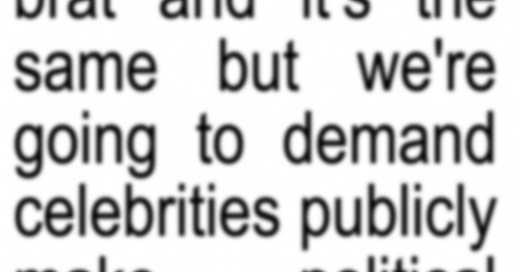Last week, I wrote about the furore of female celebrities setting boundaries. If you haven’t read that yet I am disappointed in you. No, I’m joking, sort of. Go back and read that first as this week is a follow-up of thoughts around our general relationships with celebrity figures, loosely through the lens of Chappell Roan. As well as being denied the boundaries she’s requested of paparazzi and fans, she has become the newest sacrificial lamb for those demanding she state her politics and publically endorse who she’ll be voting for just like Taylor Swift before her.
The relationships we have with celebrities are parasocial ones, one-sided where one party usually doesn’t even know of the other’s existence. For the most part, we are apathetic in our remarks about celebrities, passing comments on people like they’re fictional characters without feeling. They’re not. Surely a little gossip couldn’t hurt?
Author of Neverland: The Pleasures and Perils of Fandom, Vanessa Kisuule, was recently in conversation with
and her view sums it up perfectly. Thanks to social media, ‘You can get this false sense of proximity to artists. The ease of access we have now exacerbates the intensity and the sense of entitlement.’ Our parasocial relationships easily have the scope to evolve into something more insidious perhaps without us even realising. Kisuule goes on to say that we’re ‘looking for something to worship in a society that no longer values religion nearly as much as it once did. We all want to feel like there’s something bigger than us.’ She also references author and social critic Bell Hooks - ‘we are a deeply loveless society. We are desperately scrambling for the feeling of belonging.’ So yes, a little bit of gossip is a natural component of social behaviour. But with an increasingly anxious attachment to the crumbling communities around us and the ability to directly contact those we seek comfort from, our expectations of celebrities have reached martyrdom. Something that is too much for a single mortal flawed human being to bear. We’re at risk of losing what makes being a fan so fun and exciting: the connection between creator and audience.At the 2024 Democratic National Convention, Barack Obama stated that “we chase the approval of strangers on our phones, we build all manner of walls and fences around ourselves and then wonder why we feel so alone”. A warning about how we determine our politics and how we often seek validation in the wrong places. Generally, it appears that people have less of a vested interest in the specific political values and beliefs of celebrities because it is, in many ways, a glorified popularity contest.
Perhaps the problem begins with the fact that “fame is inextricable from American culture”, as John Hendrickson wrote for The Atlantic. The election is fast approaching and both sides are steadfast in seeking support from those with influence. Who better to engage and appeal to young voters than those with large Gen Z followings online? After all, the Harris campaign has leant into “the celebrity-fixation and meme-ification of politics” to gain voters. Think ‘brat’ rebrand and coconut trees. So it would seem that fans did not spontaneously begin to consider the politics of their favourite celebrities so decisively - political leaders themselves initiated what fans have come to now expect from their famous idols.
This is not to say that you shouldn’t care about the politics held in the more important parasocial relationships of your life. Politics shape our lives and have the power to enforce laws that may destroy them. There is nothing flippant about it. When celebrities behave in ways that are illegal or morally unacceptable, we grapple with trying to separate the art from the artist. What about separating the human from the artist? We don’t have to like an artist’s human form when it comes to their politics or their values, but we find it inconceivable to accept they should have a human form at all. Especially that they should hold views which differ from our own. When we’ve invested time, effort and often money into our parasocial relationships it can feel deeply unfulfilling when the perceived bond isn’t as strong as we thought.
As the decline in religious beliefs has been widespread since the year 2000, we lack belief in a higher power, someone to absolve us from the act of having to make a single decision by ourselves. It is any surprise? Cancel culture makes everyone fearful of having an opinion, of straying from the status quo. So much so that when Chappell Roan didn’t come out to publicly endorse Kamala Harris, a witch hunt ensued. She then felt forced to make a video attempting to give further understanding of her stance, particularly around trans issues and genocide, and clarify assumptions that not endorsing Kamala does not default mean in any way she’s supporting Trump. The role of the female celebrity has taken on every facet of the human condition and we expect one person to compass all things. All the things we’re missing, the gaps of knowledge in our own lives. Without the guardrails of a ‘moral’ existence or one curated by the structure of orbiting a particular religion, we look for the next best thing - your favourite artist’s favourite artist. We need moral direction, desperately. The trouble is, we’re unknowingly in pursuit of it in all the wrong places.
Check out some further Chappell Roan reading over on
!





